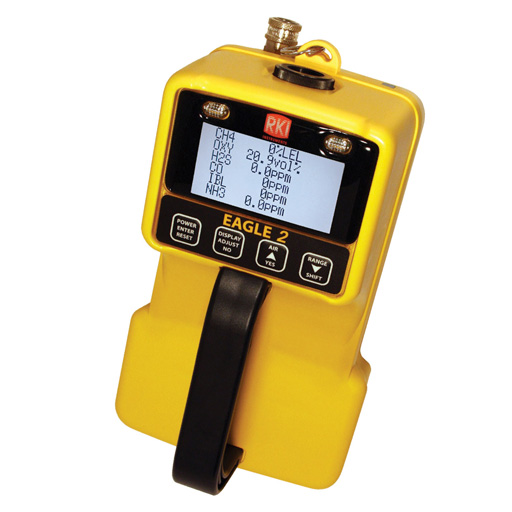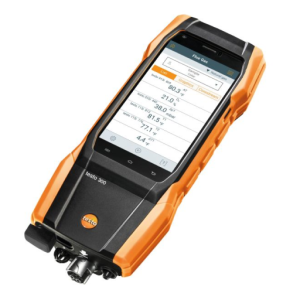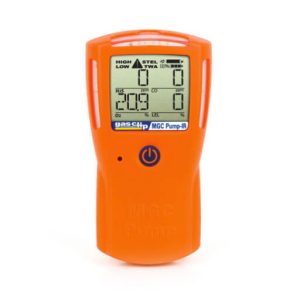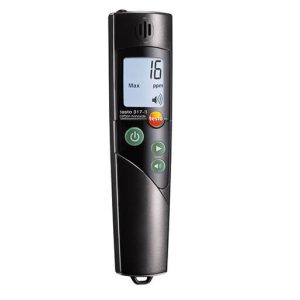The EAGLE 2 available features include a PID sensor for detecting high or low ppm levels (0-50 & 0-2,000) of VOC gases; % volume capability for CH4 and H2 using a TC (thermal conductivity) sensor; PPM or LEL hydrocarbon detection at the push of a button; infrared sensors for CO2 (ppm or % volume), methane or hydrocarbons in LEL and % volume ranges; methane elimination feature for environmental applications; and a variety of super-toxic gases.
Equipped with features unavailable on competitive units. Does much more than LEL, O2, H2S, and CO detection
The EAGLE 2 has a strong internal pump with a low flow auto pump shut-off and alarm, which can draw samples from up to 125 feet. This allows for quick response and recovery from distant sampling locations. The EAGLE 2 will continuously operate for over 18 hours on alkaline batteries or 20 hours on NiMH. A variety of accessories are also available to help satisfy almost any application such as long sample hoses, special float probes for tank testing, and dilution fittings, just to name a few. Datalogging is a standard feature for all sensors on all versions.
With its ergonomic design and large glove-friendly buttons, the EAGLE 2 offers easy access to controls such as autocalibration, alarm silence, demand zero, peak hold, methane elimination, and a wide variety of other features. Each channel has two alarm levels plus TWA and STEL alarms for toxic channels. The two alarm levels are user adjustable and can be latching or self-resetting. Rugged, reliable, easy to operate and maintain, the EAGLE 2 is the solution for just about any portable gas monitoring situation. Also, the display can be set to any of 5 languages: English, French, German, Italian, or Spanish.
Training video
RKI – GX-6000 features:
Specifications
| Enclosure | Weatherproof, chemical resistant, RFI / EMI coated high impact polycarbonate-PBT blend. Can operate in 2.0” of water without leakage. Ergonomically balanced with rugged top-mounted handle. Water & dust resistance equivalent to IP64. |
| Dimensions | 9.5” L x 5.25” W x 5.875” H |
| Weight | 3.8 Lbs (standard 4 gas with batteries) |
| Detection Principle | Catalytic combustion, electrochemical cell, galvanic cell, infrared, |
| photoionization detector, and thermal conductivity. | |
| Sensor Life | 2 Years under normal conditions. |
| Sampling Method | Powerful, long-life pump (over 6,000 hours) can draw samples over 125 feet. Flow rate approximately 2.0 SCFH |
| Display | 3 display modes: display all gases, large font-autoscroll, or large font-manual scroll. Polyurethane protected overlay. Backlight, illuminates for alarms and by demand with adjustable time. |
| Language | The readout can display in 5 languages (English, French, German, Italian, or Spanish. |
| Alarms | 2 Alarms per channel plus TWA and STEL alarms for toxics. The two alarms are fully adjustable for levels, latching or self reset, and silenceable. |
| Alarm Method | Buzzer 95 dB at 30 cm, four high-intensity LED’s. |
| Controls | 4 External glove-friendly push buttons for operation, demand zero, and autocalibration. Buttons also access LEL/ppm, alarm silence, peak hold, TWA/STEL values, battery status, conversion factors, and many other features. |
| Continuous Operation | At 70°F, 16 hours using alkaline batteries, or 18 hours using Ni-MH. |
| Power Source | 4 Alkaline or Ni-MH, size C batteries (Charger has alkaline recognition to prevent battery damage if charging is attempted with alkalines). |
| Operating Temp. & Humidity | -20°C to 50°C (-4°F to 122°F),0 to 95% RH, non-condensing. |
| Response Time | 30 Seconds to 90% (for most gases) using standard 5 ft hose. |
| Safety Rating | Intrinsically Safe, Class I |
| Groups A, B, C, D.Approvals: CSA / CE | |
| Standard Accessories | Shoulder strap, alkaline batteries, hydrophobic probe, and 5-foot hose, internal hydrophobic filter |
| Optional Accessories | Dilution fitting (50/50) |
| Ni-MH batteries | |
| Battery charger, 115 VAC, 220 VAC, or 12 VDC (charge time 4 hours) with continuous operation function | |
| Extension hoses | |
| Warranty | Two-year material and workmanship, one year for PID sensor |
Also available for rent
QUICK TIP:
1. Turning the Eagle 2 On
a. Connect the sample hose and probe to the Eagle 2’s quick
connect inlet fitting.
b. Press and briefly hold down the POWER ENTER RESET
button. Release when you hear a beep.
c. The instrument goes through its warm-up sequence and
shows screens for battery voltage, active gases, lunch break
(if LUNCH BREAK is turned on), low alarm, high alarm, STEL
and TWA, calibration reminder (if CAL REMINDER is turned
on), date and time, user ID/station ID/serial number (with user
ID and station ID only appearing if USER/STATION ID is turned
on), and sensor failures. It then goes into measuring mode.
The EAGLE 2 available features include a PID sensor for detecting high or low ppm levels (0-50 & 0-2,000) of VOC gases; % volume capability for CH4 and H2 using a TC (thermal conductivity) sensor; PPM or LEL hydrocarbon detection at the push of a button; infrared sensors for CO2 (ppm or % volume), methane or hydrocarbons in LEL and % volume ranges; methane elimination feature for environmental applications; and a variety of super-toxic gases.
Equipped with features unavailable on competitive units. Does much more than LEL, O2, H2S, and CO detection
The EAGLE 2 has a strong internal pump with a low flow auto pump shut-off and alarm, which can draw samples from up to 125 feet. This allows for quick response and recovery from distant sampling locations. The EAGLE 2 will continuously operate for over 18 hours on alkaline batteries or 20 hours on NiMH. A variety of accessories are also available to help satisfy almost any application such as long sample hoses, special float probes for tank testing, and dilution fittings, just to name a few. Datalogging is a standard feature for all sensors on all versions.
With its ergonomic design and large glove-friendly buttons, the EAGLE 2 offers easy access to controls such as autocalibration, alarm silence, demand zero, peak hold, methane elimination, and a wide variety of other features. Each channel has two alarm levels plus TWA and STEL alarms for toxic channels. The two alarm levels are user adjustable and can be latching or self-resetting. Rugged, reliable, easy to operate and maintain, the EAGLE 2 is the solution for just about any portable gas monitoring situation. Also, the display can be set to any of 5 languages: English, French, German, Italian, or Spanish.
Training video
RKI – GX-6000 features:
Specifications
| Enclosure | Weatherproof, chemical resistant, RFI / EMI coated high impact polycarbonate-PBT blend. Can operate in 2.0” of water without leakage. Ergonomically balanced with rugged top-mounted handle. Water & dust resistance equivalent to IP64. |
| Dimensions | 9.5” L x 5.25” W x 5.875” H |
| Weight | 3.8 Lbs (standard 4 gas with batteries) |
| Detection Principle | Catalytic combustion, electrochemical cell, galvanic cell, infrared, |
| photoionization detector, and thermal conductivity. | |
| Sensor Life | 2 Years under normal conditions. |
| Sampling Method | Powerful, long-life pump (over 6,000 hours) can draw samples over 125 feet. Flow rate approximately 2.0 SCFH |
| Display | 3 display modes: display all gases, large font-autoscroll, or large font-manual scroll. Polyurethane protected overlay. Backlight, illuminates for alarms and by demand with adjustable time. |
| Language | The readout can display in 5 languages (English, French, German, Italian, or Spanish. |
| Alarms | 2 Alarms per channel plus TWA and STEL alarms for toxics. The two alarms are fully adjustable for levels, latching or self reset, and silenceable. |
| Alarm Method | Buzzer 95 dB at 30 cm, four high-intensity LED’s. |
| Controls | 4 External glove-friendly push buttons for operation, demand zero, and autocalibration. Buttons also access LEL/ppm, alarm silence, peak hold, TWA/STEL values, battery status, conversion factors, and many other features. |
| Continuous Operation | At 70°F, 16 hours using alkaline batteries, or 18 hours using Ni-MH. |
| Power Source | 4 Alkaline or Ni-MH, size C batteries (Charger has alkaline recognition to prevent battery damage if charging is attempted with alkalines). |
| Operating Temp. & Humidity | -20°C to 50°C (-4°F to 122°F),0 to 95% RH, non-condensing. |
| Response Time | 30 Seconds to 90% (for most gases) using standard 5 ft hose. |
| Safety Rating | Intrinsically Safe, Class I |
| Groups A, B, C, D.Approvals: CSA / CE | |
| Standard Accessories | Shoulder strap, alkaline batteries, hydrophobic probe, and 5-foot hose, internal hydrophobic filter |
| Optional Accessories | Dilution fitting (50/50) |
| Ni-MH batteries | |
| Battery charger, 115 VAC, 220 VAC, or 12 VDC (charge time 4 hours) with continuous operation function | |
| Extension hoses | |
| Warranty | Two-year material and workmanship, one year for PID sensor |
Also available for rent
QUICK TIP:
1. Turning the Eagle 2 On
a. Connect the sample hose and probe to the Eagle 2’s quick
connect inlet fitting.
b. Press and briefly hold down the POWER ENTER RESET
button. Release when you hear a beep.
c. The instrument goes through its warm-up sequence and
shows screens for battery voltage, active gases, lunch break
(if LUNCH BREAK is turned on), low alarm, high alarm, STEL
and TWA, calibration reminder (if CAL REMINDER is turned
on), date and time, user ID/station ID/serial number (with user
ID and station ID only appearing if USER/STATION ID is turned
on), and sensor failures. It then goes into measuring mode.













